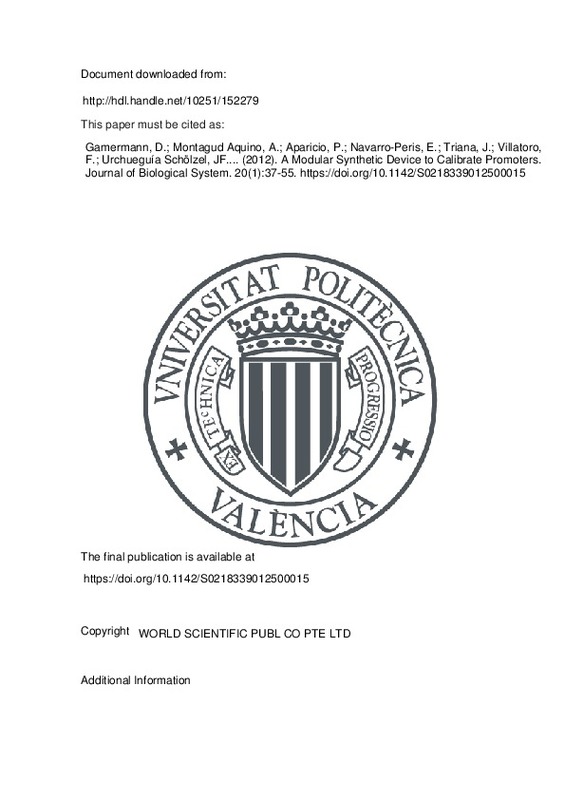Elowitz, M. B., & Leibler, S. (2000). A synthetic oscillatory network of transcriptional regulators. Nature, 403(6767), 335-338. doi:10.1038/35002125
Becskei, A., & Serrano, L. (2000). Engineering stability in gene networks by autoregulation. Nature, 405(6786), 590-593. doi:10.1038/35014651
Monod, J., & Jacob, F. (1961). General Conclusions: Teleonomic Mechanisms in Cellular Metabolism, Growth, and Differentiation. Cold Spring Harbor Symposia on Quantitative Biology, 26(0), 389-401. doi:10.1101/sqb.1961.026.01.048
[+]
Elowitz, M. B., & Leibler, S. (2000). A synthetic oscillatory network of transcriptional regulators. Nature, 403(6767), 335-338. doi:10.1038/35002125
Becskei, A., & Serrano, L. (2000). Engineering stability in gene networks by autoregulation. Nature, 405(6786), 590-593. doi:10.1038/35014651
Monod, J., & Jacob, F. (1961). General Conclusions: Teleonomic Mechanisms in Cellular Metabolism, Growth, and Differentiation. Cold Spring Harbor Symposia on Quantitative Biology, 26(0), 389-401. doi:10.1101/sqb.1961.026.01.048
Ishiura, M. (1998). Expression of a Gene Cluster kaiABC as a Circadian Feedback Process in Cyanobacteria. Science, 281(5382), 1519-1523. doi:10.1126/science.281.5382.1519
Gardner, T. S., Cantor, C. R., & Collins, J. J. (2000). Construction of a genetic toggle switch in Escherichia coli. Nature, 403(6767), 339-342. doi:10.1038/35002131
Stricker, J., Cookson, S., Bennett, M. R., Mather, W. H., Tsimring, L. S., & Hasty, J. (2008). A fast, robust and tunable synthetic gene oscillator. Nature, 456(7221), 516-519. doi:10.1038/nature07389
Becskei, A. (2001). Positive feedback in eukaryotic gene networks: cell differentiation by graded to binary response conversion. The EMBO Journal, 20(10), 2528-2535. doi:10.1093/emboj/20.10.2528
Sayut, D. J., Niu, Y., & Sun, L. (2006). Construction and Engineering of Positive Feedback Loops. ACS Chemical Biology, 1(11), 692-696. doi:10.1021/cb6004245
Weber, W., & Fussenegger, M. (2006). Pharmacologic transgene control systems for gene therapy. The Journal of Gene Medicine, 8(5), 535-556. doi:10.1002/jgm.903
Walz, D., & Caplan, S. R. (1995). Chemical oscillations arise solely from kinetic nonlinearity and hence can occur near equilibrium. Biophysical Journal, 69(5), 1698-1707. doi:10.1016/s0006-3495(95)80039-1
Santos, C. N. S., & Stephanopoulos, G. (2008). Combinatorial engineering of microbes for optimizing cellular phenotype. Current Opinion in Chemical Biology, 12(2), 168-176. doi:10.1016/j.cbpa.2008.01.017
Alper, H., Fischer, C., Nevoigt, E., & Stephanopoulos, G. (2005). Tuning genetic control through promoter engineering. Proceedings of the National Academy of Sciences, 102(36), 12678-12683. doi:10.1073/pnas.0504604102
Liang, S.-T., Bipatnath, M., Xu, Y.-C., Chen, S.-L., Dennis, P., Ehrenberg, M., & Bremer, H. (1999). Activities of constitutive promoters in Escherichia coli 1 1Edited by D. E. Draper. Journal of Molecular Biology, 292(1), 19-37. doi:10.1006/jmbi.1999.3056
Smolke, C. D., & Keasling, J. D. (2002). Effect of gene location, mRNA secondary structures, and RNase sites on expression of two genes in an engineered operon. Biotechnology and Bioengineering, 80(7), 762-776. doi:10.1002/bit.10434
Khlebnikov, A., Skaug, T., & Keasling, J. D. (2002). Modulation of gene expression from the arabinose-inducible araBAD promoter. Journal of Industrial Microbiology and Biotechnology, 29(1), 34-37. doi:10.1038/sj.jim.7000259
Cox, R. S., Surette, M. G., & Elowitz, M. B. (2007). Programming gene expression with combinatorial promoters. Molecular Systems Biology, 3(1), 145. doi:10.1038/msb4100187
Chu, D., Zabet, N. R., & Mitavskiy, B. (2009). Models of transcription factor binding: Sensitivity of activation functions to model assumptions. Journal of Theoretical Biology, 257(3), 419-429. doi:10.1016/j.jtbi.2008.11.026
Chesi, G. (2011). Robustness analysis of genetic regulatory networks affected by model uncertainty. Automatica, 47(6), 1131-1138. doi:10.1016/j.automatica.2010.10.012
[-]







![[Cerrado]](/themes/UPV/images/candado.png)


